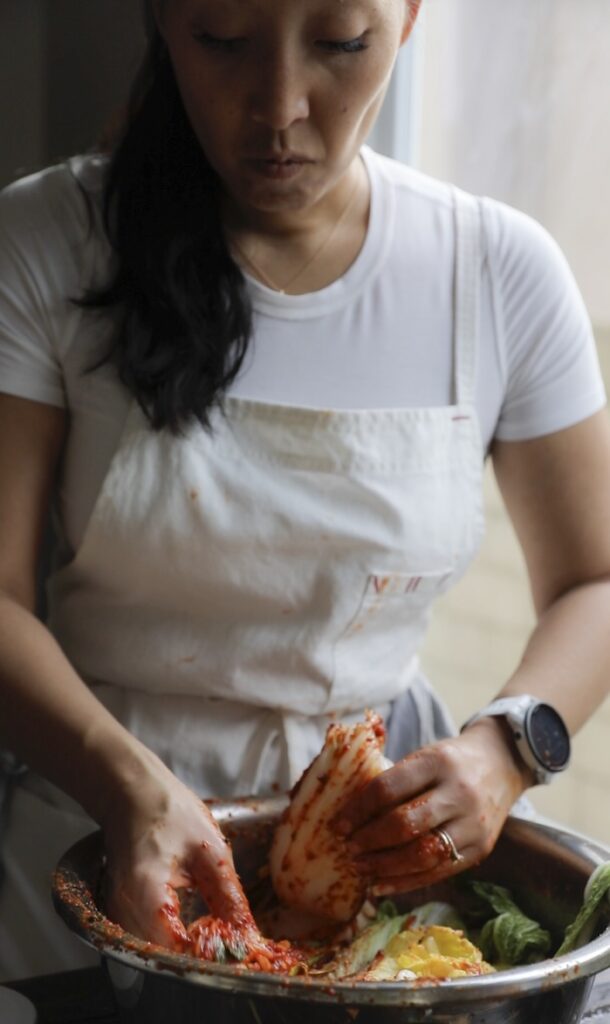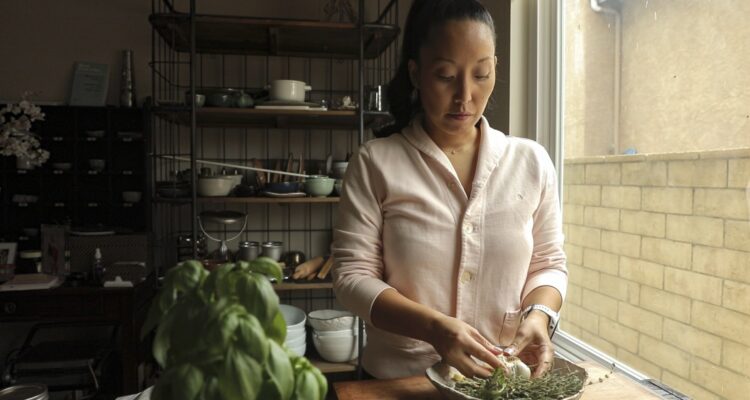Showing affection and sharing memories through food. Since 2016, Joanne Lee Molinaro has been writing her recipes on The Korean Vegan blog, and in 2020, in the midst of the pandemic, she opened her TikTok profile where she tells the stories of her family and her life while preparing delicious vegan food. A success that led her to be among the most followed food bloggers on social media and to winning the prestigious James Beard Media Award with her cookbook “The Korean Vegan Cookbook.”
There is a common belief that Korean food is meat-centred, from bulgogi to samgyeopsal, but
the reality is that the traditional Hansik is very much vegetarian and vegan. Just by considering the banchan that we know are mostly made with namul or that temple food avoids the use of animal products. How was your food growing up, and how did your food change when you
became vegan?
My family was not wealthy in Korea and although we were much better off in the United States,
we didn’t consider ourselves rich. Accordingly, growing up, we had very humble meals, with little
meat. My grandmother nursed a garden in our backyard–squash, tomatoes, corn, perilla leaves,
peppers. These are the foods that filled our dining table. Meat was reserved for special
occasions, like birthdays or holidays. As a result, when I went vegan, I discovered it wasn’t
nearly as difficult as I thought it would be. I would still get to eat many of the same foods I grew
up eating, just by excluding one or two ingredients (e.g., fish sauce).
How did food help you reconnect to your family history?
Food was always a starting point for me. I could ask my mother about how to make sujebi, and
to her answer she would append the story of how her mother used to make it for them when
they were so poor, how watery the soup was because they had nothing but old roots to flavor
the broth, and thus how even though sujebi is so popular in my generation, for my mother, it
represents poverty and deprivation (and she thus hates it!). I remember many years ago, my
mother started roasting a sweet potato in her toaster oven every day. While peeling one of them,
she told me they were her “favorite food,” and when I asked her why, she explained that she
used to dig up the leftover sweet potatoes when she was a little girl and eat them raw.
What is your Korean comfort food?
I love soondooboo chigae. It is the first dish my mother taught me to make and the silken
chunks of tofu always make me feel loved and soothed!
From successful firm attorney to content creator , marathon runner, author and
podcast host among other things. How was it to switch your career from your previous
job to a creative one in which you open yourself to the public to talk about your
personal life as well. Did it help you overcome certain issues you struggled with in the
past?
Changing careers was terrifying! My parents were so against it and I also had a lot of doubts.
But in the end, it allowed me to pursue more artistic endeavors, ones that I found far more
fulfilling on a personal level. Being in the public eye and sharing vulnerable stories from my
past can be challenging, sometimes, because I feel like everyone is judging me all the time.
But, for the most part, I share parts of myself that have been fully formed–I don’t talk about things that are still hurting me or that I am still struggling with, mostly to protect myself. I talk
about things that have happened in my past and that I am recovered from, so that I can share
insight facilitated by the distance of time.

When I first started learning about Korean food culture, I discovered many similarities,
myself being Italian, with the food culture I grew up with. How has it been for you and
your partner adapting to each other’s food culture?
I think there are so many similarities between Italian food culture and Korean food culture,
starting from a fundamental love of food! But, more importantly, I see a beautiful humility in the
food of both cultures–it isn’t about being pretentious or snobby. It’s about survival, community,
and love. When Hahlmuhnee used to make me chigae, it was very similar to when Nonna used
to make my husband pasta. It doesn’t need to look pretty, it just needs to taste delicious and
fuel our bodies. Also, Anthony’s love of pasta is parallel to my love of noodles!! Therefore, it’s
very easy to make food that pleases us both!
What is your opinion about veganism and vegetarianism in Korea? Is it becoming
more accepted and acknowledged?
Only .2% of people in South Korea avoid consuming meat. Accordingly, vegetarianism, much
less veganism, is exceedingly rare in Korea. That said, temple food–a type of cuisine that
largely avoids animal products–is experiencing a surge in popularity and many celebrities have
begun adopting plant-based diets for health reasons. You see major food manufacturers like
Pulmuone making deep investments in plant-based foods, as well as innovations in plant-based
K-beauty that suggests that Korea is certainly “plant curious.” That said, it remains very difficult
to navigate a completely vegan life in Korea–even though much of the food is vegetable
forward, many “banchan” will have fish sauce in it. My hope is that in 5 or 10 years, we will see a
normalization of plant-based and vegan options, much like we’ve seen in Italy. When we first
went to Rome, vegan cornetti were a rarity. Now, you can get them at the airport!

